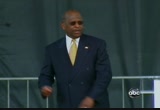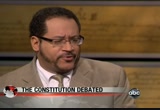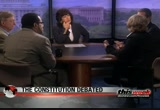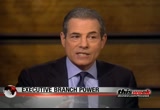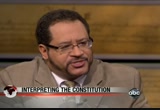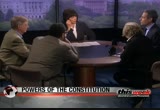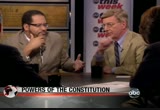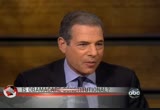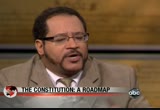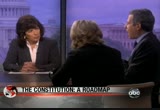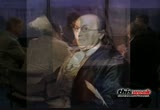tv This Week With Christiane Amanpour ABC July 3, 2011 10:00am-11:00am EDT
10:00 am
this wee "this week." >> it's the constitution. >> tug of war over the constitution. the 200-year-old document that still infires people all over world. it's a reflection of america's past and its promise. and it's now at the heart of the fierce political debate. we exam the cornerstone of the u.s. government. and the american dream. making sense of the melting pot, and the country of immigrants grapples with tough times. and then the dream deferred. >> everything was so secure from what i thought, and everything changed. >> as the rich get richer. millions of americans are finding hope, harder to come by. they are down, but not out.
10:01 am
>> announcer: live from the newseum in washington, "this week" with christiane amanpour starts right now. >> welcome from the special independence day program from the night studio in washington, d.c. this week, focus on the founders with washington tied up in knots, thousands of troops fighting overseas and millions of citizens struggling to get by. we go back to the original blueprint of this democracy, the constitution. a document that endures and guides the united states and is now in the heart of a political battle to define ha this country stands for. here's abc's john donvan. >> reporter: the original lives under glass.
10:02 am
has no price tag, is the world's oldest and shortest in length. 4,400 not entirely correctly spelled words, sorry, pennsylvania. while it's our habit to speak of it in reverence. >> it's all of man kind. >> reporter: in holy language. >> it provides a compass that can help us find our way. >> reporter: as something sacred. >> the constitution provides a perfect path towards a more perfect union. >> reporter: here's the other way we've long tended to treat the constitution, as wrapping paper, as in wrap yourself in it to make your case sound better type of wrapping paper to put a nice bow on it. which is really nothing new. every case that ever gets to the suprememcourt, get there's because both sides argue, they have the constitution on their side. richard nixon, refusing to give up his space, said the constitution protected him. he lost. folks who want to burn the american flag, said the constitution protects them. they generally win. people, who argue the constitution protects the unborn
10:03 am
have yet to win their battle. the point is, the constitution, which we think of as a set of rules, is really a departure point for a good, strong argument about the details. the details of who we are as a nation and what we stand for. although, this year, since the tea party arrived in force over the halls of congress and launched its tenure with the reading of the constitution, the argument has become a more big picture thing. the tea party arguing the country slipped its constitutional moorings in a wholesale way. >> i believe in the founding father's vision of a limimed government. >> reporter: it's an argument that income taxes and federal reserve in governmein governmen guarantee health care and government that keeps
10:04 am
growing is not all that is intended by the framers of the constitution. the guys whose intellectual garb they honor at rallies, garnering in what they did. we need to go back, but who is to agree what that means? >> we need to reread the constitution and enforce the constitution. there's a little section in there that talks about l le, liberty and pursuit of happiness. reporter: actually, that's not the constitution, that's the declaration of independence. lots of people seem to mix them up. >> drawing on promise and shrine in our constitution, the notion that we're all created equal. >> it's a very slippery slope to cherry picking your favorite golden oldie from the founding fathers and slapping it on political speeches. democrats and republicans quote from the founding fathers, but we shouldn't act like they were somehow omnipotent. >> in paintings, they were not god, guys who didn't give women the vote and let slavery stand for the time being and who were, by the way trying to create a stronger central government, of course not too strong, leaving to us a constitution that we could fix, as needed, sorry,
10:05 am
make that amend, which we've now done, 27 times. >> when you look at founding documents of our country, they are elastic, they are meant boo toe pulled and bent in different directions as each era dictates. >> reporter: so, today, right now, when we argue whether it's constitutional to send drones over libya. for the government to make immigrants carry i.d. cards. those are only possible in a sense because there is a constitution, as the framers wrote in its very first paragraph, they wanted to secure the blessings of liberty, for our posterity, that's us, we, the people. we're still here, thanks to them and this piece of paper. for "this week" i'm john donvan in washington. >> so, as just seen, now more than ever, the constitution is at the very heart of the political debate these day, congress is now requiring that every piece of legislation come accompanied by the
10:06 am
constitutional justification. and the tea party is demanding the return to the kind of government that the frame envisioned. just what did those men who lived 200 years ago really want? joining me now, for discussion of truth and myth, george will, michael eric dyson of georgetown university, harvard university history professor, jill lepore, who is also the author of "whites of their eyes" and richard stengel. editor in chief of "time" magazine. and writer of the cover story, on the constitution "does it still matter." thank you for being here. let me start with you, george. how do you explain the ubiquity of the cons tus today as a real living piece of political debate? >> first of all, american politics always has a retrospective cast. looking back on the constitution. all of our arguments get litigated through these documents. did jefferson have the power to make the louisiana purchase. james madison, the successor,
10:07 am
the architect of the constitution vetoed an internal improvements bill. they thought that went beyond the powers of the federal government down to today. when the most novel new development, the tea party movement is named after something that happened in 1 13. there's a retrospective cast naturally y ilt into our politics, but what happened today, a large number of americans, this one included, believed that the somewhat promiscuous expansion of government power in recent years, raises questions about whether we still have a government of limited, delegated and enumber ra tiv powers.s. >> you say last year, you mean particularly now in the obama administration? >> yes. >> what do you say to that very categoric -- >> wow, i think this retrospective cast that george will refers to is absolutely right. there's cap, holes, gulf, abysses. you read the constitution but oops, i forgot the part about slavery.
10:08 am
you talk about women and people of color who have been distorted. relegated to the margins and all together seen as marginalia. i think the constitution is a powerful, living document. it's been hijacked by people with narrow, vicious and parochial visions. i think the assertion that we, of all people, this generation is somehow vulnerable to rebuff the contusion is like a regalian problem. and they find the resting point in you. it's durable, powerful. because of its flexibility. black people and others were able to argue into an american identity in a vision for democracy that initially they were barred from, so i think it's powerful. >> you do say hijacked by a vicious band of people. do you think that's fair? is that what is going on right now? >> i think it's the case that the constitution has always been a subject of contest. each generation of americans struggles to inherit the mantle and claim the mantle of the
10:09 am
revolution and constitution. what is a bit unusual about this political moment, is that a lot of people are trying to claim both, the revolution and constitution. the revolution and constitution. it's been more of an oscillation. the revolution is claimemeby the left. ththconstitution is more often celebrated by the right. the tea party movement really embraced both and in a way collapsed the two which is interesting, as a historical phenomenon. it's neither novel or sinister. >> let me go back to george, then.nor sinister. >> let me go back to george, then. you say that it's become so important right now, because of what you think is the excesses of the obama administration, so you both are saying it's because of barack obama, but from different positions. >> yes, indeed, mr. obama claimed for the federal government, the power to do things that are simply unprecedented. even the people who say that the mandates require american citizens a aconditions of living in america to buy health care. no one denies that's an
10:10 am
unprecedented expansion of federal power. >> you look at -- i mean, every president, expands federal power. their view is from where they sit, and the oval office looks pretty great. george bush was the greatest exponent of expansion of american power in american history with the exception of fdr and abraham lincoln. i think obama is exceptional in this regard, rather than just a continuation of what the tradition has been is kind of crazy to me. one of the t tngs the founders did. which we forget about. in this discussion that the founders didn't actually create a large federal government, they didn't. what they created was a very weak executive. article 2, about the -- about what the president does is about half the size of article 1. they didn't want a very strong executive, because they feared kings. but pretty much every president since then has been expanding executive power and there are all kinds of reasons, both good
10:11 am
and bad for it which we can discuss. >> jill, as a historian. rick stengel brought up the idea of big government or small government. didn't the constitution give more power to a federal government, to a centralized government? >> it's suggested it's centralized and strengthened, especially in reference to the article of confederation, which states, 13 separate currencies. and each state can have its own navy. think about small government and big government it's hard to do that in the abstract. in the postal service in 1790 was six people. i think it's really easy to get kind of tangled upupn intensity of our own modern political rhetoric. >> the framers of the constitution wanted to strengthen the federal vernment. they knew the government was, "a," necessary, and, "b," dangerous. in the act of creating a more
10:12 am
competent government they sought to limit james madison, the architect of the papers, said, the powers delegated to the federal government by the proposed constitution are few and defined. thth's either true or it's not. >> that is the continuing shift and balance that's been going on throughout our history. >> you just raised this. obviously, two different held views on the size of government and strength of central versus the state. so, the question then is, is it an absolutist document? is it open to interpretation? is it something that the letter of the law and actual words have to be followed today, 200 years later? >> it's one thing to say it's open to interpretation, which is obviously is, it's very open, textured language. on the other hand, you say unreasonable searches and seizure, what's reasonable? we argue about that. but to say the constitution is a living, evolving document like you did, is almost oxymoronic. a constitution is supposed to freeze things.
10:13 am
it is an anti-evolutionary device. justice scalia said. it is intended to put certain thing, beyond the reach of transient majorities. that's the language of justice jackson in a famous s se. the point of the constitution is that majorities are dangerous and we have to protect against them. hence, what oliver wendell holmes said, if m m fellow citizens want to go to hell, i'll help them. because that's my job. he said they exist to majorities, that's wrong. >> that's great on paper when is where it's written. when it makes the transition from parchment to pavement. there's the rub. when i'm talking about the document being living and vital i'm talking about the interpretation of it. i'm talking about the meaning of it. i'm talking about the symbolic power, the purchase of notions of freedom, justice, equality and dem democracy, they must travel into our common humanity.
10:14 am
i'm suggesting that that docucument is critical to the reinterpretation of people of color, and women. we were rejected into the mainstream of america. we're not for r me vibrant reinterprptation of that document and appealing to its living legacy. none of us could be here. i wouldn't be here talking to you, not as an equal, at least. >> one of the misnomers in our society, a lot of people confuse it with h the declaration. declaration is the music. the constitution is lobredo. what we cherish is in the declaration and the amendment and bill of rights which people forget was not part of the original constitution. >> we'e' here today and i want to know what you think about this, george, and jill as well. we get a sense, certainly from the tea party and big political leaders now, michele bachmann, sarah palin, she hasn't jumped in, but nonetheless, they are framing the debate. this is a document under siege. do you think it's under siege? >> has been for a century.
10:15 am
woodrow wilson, through the rest of the progressive moments set out to say the constitution was all very well once, but now we're a more complicated society with grand ambitions for the government. therefore what the founders did, which is put the government on the short leash has to be undone. weweave to cut the leash on government. that's what the progressive project has been for a century. >> therein lies the organs of this particular impasse that we are in now. this is very old impasse. i think the sense of crisis is virtually exaggerated. we have a very adversarial journalistic world. in which we'll hear more about crisis than not. but the framing of that debate dates to the progressive era. there's a set of arguments made that the document is a piece of parchment and needs worships as such in the way we worship other documents that have different kinds of meaning to us. that idea goes much further back and i think indeed it can many ways be traced to the founders themselves. when jefferson said the
10:16 am
constitution should never be looked as the arc of the covenant, we find other kinds of -- >> you bring in the religious aspect of it. and, today, again, it is something that so many people talk about it as if it was a religious document. there is no word "god" in the 4,000 words of the constitution. is it possible to say it was divinely inspired? even though it doesn't say -- >> the constitution, again, i go back to the difference between the declaration and constitution. it's a blueprint for the house. it doesn't tell you what color curtains to have or whether to have two stories or three stories. it's a road map. it's a guideline. a kind of guardrail. doesn't tell you where to be but to prevent you from straying off. i would say that the constitution is resolututy areligious or outside of the framework the founders were working in and other thins.
10:17 am
if you read it, it doesn't have poetry in it. it's just a guideline. >> i argue that the amendments is why i get the point about the difference between the declaration of independence and constitution. the amendments suggest we are having doubts, skepticism. rethinking a broader circle of privilege for those historically locked out which means exclusion of some people and inclusion of others suggest politic, negotiation. the document itself about being a blueprint for and not telling us what color the curtains are, but does suggest that the fundamental document has to be opened up. >> framers were not narrowed and blinkered men. they were men of enlightenment. they believe in progress to which end they included an amendment provision, they said there will be changing made. the difference is, do you amend the constitution by the casual weak interpretation of it. or do you candidly, when you want to change the structure of the government, change it by the amendment proceseswe provided?
10:18 am
>> we'll discuss that after the break and discuss some of the specific issues that are being used in the political debate right now. so, up next, we'll talk about war, taxes, health care. how does the constitution address the great issue of our time. the "roundtable" weighs in and later, living the american dream. the immigrant experience at a crucial cross rhodes.
10:19 am
you'd be hard pressed to find an american who doesn't see the constitution as the foundation of government. but after that, things get murky, would the constitution allow a law requiring people to buy health insurance. do second amendment gun rights hold up in the age of the assault weapon. when the first amendment was drafted, could the authors have dreamt that one day it bo protect violent video games? let's bring back the "roundtable."
10:20 am
let's get to these specifics which is so much part of the country today. we touched briefly on health care. the whole debate about president obama's health care act is being called unconstitutional in some quarters. is that going to be challllged by the stroke? >> 26 states, more or less, count 26 in various courts around the country in a case absolutely certain to be decided in the supreme court. the question is, has the congressional power to regulate interstate commence been so loosely construed that congress can do nothing at all. let me ask the three of you. obviously,y,besity and its costs affect interstate commerce. does congress have the power to require obese people to sign up for weight watchers? if not, why not? >> justice vincent's opinion about obama care saying the government can't regulate inactivity. we're stretching the commerce
10:21 am
clause too far. it's kind of silly. everything having to do with health care crosses state boundaries. even the notion of the clause as regulating across the state as an antiquated idea. the government can ask you to do things. it asks us to -- >> it's asking us to mandate. >> it asks us to pay taxes, asks us to register for the draft. asks us to buy car insurance if we want to drive a car around. if something is unconstitutional. people out there tend to think some alarm bell will go off if something is unconstitutional. it's unconstitutional if the supreme court decides it's unconstitutional. by the way, this can go to the supreme court and we'll see whether that happens. >> does congress have the power to mandate that obese people sign up for -- do they have the power to do this? >> i don't know the answer to that. you. >> don't know. the bebety of that is. we predict rick would say that. that's the color of the curtain
10:22 am
the basic foundation is set. >> is that yes, the power does have the power? >> it's open. if they decide they will, they will have the power to do so. >> it's important, sound the note this debate is what the constitution is about. we can have this debate. this is evidence that the constitution is working. >> let me ask also, because obviously, so much has changed and obvious to say that, but in 200 years, could the framers have ever imagined assault weapons or violent video games or whatever, when it was written, not in stone, on parchment, what about very contentious second amendment which is also the hot potato. it was for regulated malitia, but also pre, within the time of the musket. >> it was, george washington, i believe in 1791 signed a bill asking americans to buy muskets and buy ammunition. the second amendment is one of those issue, where, the way it's been interpreted over 200 years
10:23 am
affects the way it is now. i don't know if anybody knows the exact meaning of the second amendment, in terms of what is absolutely -- what the clear intent of the frame is worth. in fact i argue whatever that was, it's adapted to this new world that we're living in now. if we talk about second amendment or war powers act. george washington would not have known what to do about whether drone warfare qualifies as an act of military engagement therefore engages the war powers act. the war powers act may be unconstitutional. it has never been tested. >> in the first decade of the 21st century, that 18th century amendment pertaining to bearing arms was settled to where the stroke said, based on extraordinary scholarship said it protects the individual right not collective right of malitias. founding fathers didn't know anything about telephones, but they did say in the fourth
10:24 am
amendment that we should be protect from unreasonable searches and seizures, and the court applying the value of the framers, applied that to wire-taps, and a whole set of law evolved around that. the fact that the framers didn't envision a particular technology by no means applying what they wrote to modern conditions. >> we are agreeing. the point is they couldn't anticipate things that they didn't know existed. as a result of th, it leaves -- it's left up to us to interpret ha they meant. i think the constitution is like the bible. some christians relationship to the bible. some people of literalists. they believe in the literal interpretation of the world. some are liberal and think this is the suggestion of the moral identity, and we must not adhere
10:25 am
strictly to that. we, can interpret them andndpply them in ways that are edifying. we can't assume we know the one to one correlation between the founding fear, the constitution and what we do today. >> for instance, the first amendment, the controversial, in some quarter, ruling by the supreme court this week, regarding violent video games for children. there are many parents who have been sort of outraged by that. yet, it's framed in a basic first amendment right. is that an example of something that is obvious? it should be like that, or is that also part of the struggle to figure out how to match 200 years with today? >> i think it was important not to collapse the distance between 200 years and today and understand the history that's come in between the two. there's this great moment, if i could be preserved in a vat of madeira wine and be reawakened. in 100 or 200 years, i would really like to see how this country turns out. >> didn't people say, and you wrote about this. he was amazingly perspicacious when this constitution was signed.
10:26 am
he stood up and said, i don't know whether it's the best. it might be the best. >> they really thought a lot how this document would be understood overtime. and ben franklin, making a joke. and ben franklin, making a joke, saying be preserved in madeira wine. but was sure to put in the record of the proddings on the last day when the constitution was signgn, this clip about if he stole from someone -- always these jokes. the only difference between the church of england and churchchf rome i ithe former is infallible, and the latter is never wrong. if i were around long enough. i would change my mind. so other people change their minds and that's how this document works. >> he said right after that. in that speech, he said let us all doubt a little of our own infallibility. that's great advice. the discussion that happens between the tea party, progressives, everybody thinks they have the god's honest truth about this.
10:27 am
there's absolutely one way of interpreting it. even franklin, the founding, founding father said let us doubt our infallibility. that's what the constitution is for. when marshall said, you have to adapt it to the current times, he set that in motion for the rest of our history. i think we do have to adapt t t . >> i want to get your fil thoughts through the process of asking each of you which is your favorite founding father. who is your favorite founding father and why. >> well, i would have to say, madison. because he really was -- not because of weighs the shortest founding father, he was 5'2" by the way. but he was the architect of the constitution, and i felt tried to balance the more centralized vision of hamilton and more decentralized vision of jeff and the document was the great
10:28 am
est compromise in human history. >> compromise, isn't that a word we hear about a lot now? >> ben franklin's sister, jean, on the anniversary of the declaration of independence. she had been reading richard price and said, i think what i realized is that in this world there are very few people able to break through the barriers of poverty and ignorance. there are isaac newtons all over the world we'll never hear froro she represents the great lessons of the promise of the revolutionary era. >> i would have to say thomas jefferson. in his life, the genius, specifically individualized expression. incredible contributions of the declaration of independence, he didn't want it in any way revised. and the flourishing of dempsey despite his beauty flaws and the
10:29 am
beauty of him tethered to salley henning, at the end of the day, ink, abstract discourse, it's about flesh, engagement and lived realities. salley hennings' flesh and lived reality are e part responsible for us understanding the arc, and the beauty and luminous intensity of the documents we have, and the in with in order to realize them. so i say thomas jefferson. >> the framer that towers over the rest is little thomas, little james madison. someone said never so much high ratio of mind to mass. and the argument we're having today is whether james madison, of the princeton class of 1771 can save the constitution from woodrow wilson of the princeton class of 1879 and the progressive movement. that's an intramural argument at princeton. >> thank you very much. and up next, will the melting
10:30 am
10:32 am
the words of every american and many immigrants s ow about heart. give me your tired, poor, huddled message, yearning to breathe free. those lines inscribed on the statue of liberty, greeted new immigrants at the dawn of the last century and now the conversation has changed and so has this melting pot nation today's newcomers are not welcome with open arms. the new immigration wave sees unforeseen challenges and unexpected opportunities. joining me to discuss the way forward, george will, michelle rhee, a former dc schools chancellor, first-generation american, mel martinez, the former florida senator and one-time chairman of the republican national committee. immigrated from cuba as a boy and jose antonio vargas, a pulitzer prize winning former reporter for "the washington post" who recently published an article acknowledging that he's an illegal immigrant. thank you for being with me.
10:33 am
let me go to you first. two weeks ago you wrote this article coming out as an illegal. what were you trying to plush? it's a risky strategy. >> risky and a lot of people said irrational. in many way, the goal is to expose how incredibly s, the go expose how incredibly dysfunctional and irrational the whole system is and has been for quite some time. in many ways, i represent kind of us, with a lot of people, how broken the immigration system is. and we've never, this country, republicans, democrat, journalists have yet to come to one table anantell the truth about where we are on this issue. >> you spent most of your youth lying about it, deciding to lie about it even when you were a reporter. at one point you were told you are illegal. you didn't know that. >> no. i found out. a lot of undocumented youths that come to this country. i didn't find out until i was
10:34 am
16 years old and went to the dmv to get a driver's permit. that's when i find out.. the first instinct, don't let anybody think i'm not american. thank god for television, that's where i learned how to speak learn. learn slang and figure out i need to read "the new yorker," "newsweek" and "time" magazine to adapt further. >> so you're obviously working on this issue, you're trying to achoov something rational. you heard what jose said this is an irrational situation. is it? >> it is. we have a lot of people who lived in our country for many, many year, some brought in as youth. the fact is, we have a system that's not been working for american or for poor immigrant people who way be in the country who just want to become americans. >> mayor bloomberg called the lack of immigration reform highly skilled people. national suicide. is there a root to changing this
10:35 am
now in today's political climate? >> i think a piecemeal approach can be obtained and there's some things we need to do just for the good of our country and the good of our economy. we have tremendous shortage in the high tech fields, science, technology and mathematics where we really need people from other countries learning these skills to be able to come here and create jobs. >> creating numbers that are adequate to fill the demand is something that we ought to do -- it's good for america. we ought to just do it. >> michelle, let me ask you u oa very human level. somebody like jose got through because his teacher, some of them knew, some off them had to lie to protect him or at least not tell the truth. how difficult is if for educators around the country when faced with situations like jose's? >> i think it's very difficult. as educators and public employees, people know that they have certain response ants to the government. but at the same time, our
10:36 am
primary responsibility, as educators is to the children and ensuring that we are -- are acting within the best interest of the kids that we are serving. and, you know, when you look at it from a very h hanistic standpoint, you have so many teachers out there who are teaching kids, they may know some of them are illegal immigrants, but you see sort of what the kid needs, what the potential of these children are, and you just want to make sure they are taught properly and that they, you know, can move forward to be successful. so that's, i think the mind set that most educators and most teachers in this country have. >> give us a idea, you are first generation american. what is it like for you to be here, parents in south korea. how did you assimilate? >> for me, it was very interesting. but i think it was probably also very similar to what most immigrants' kids experienced. which was sort of living in two different worlds. my parents left south korea, and sort of wanted to raise us in the world, that they had been raised in.
10:37 am
and, one of the thing is find very interesting, my cousins who grew up in korea, are more liberal and raised in much more very interesting, my cousins who grew up in korea, are more liberal and raised in much more very interesting, my cousins who grew up in korea, are more liberal and raised in much mo f very interesting, my cousins who grew up in korea, are more liberal and raised in much more conservative ways than we were. korea is moving along. in my parents' mind, korea is raised us in the korea they grew up in. there was a very stark difference between their mind set of what kids should and do and be like, versus like what my friends were experienced every day. >> george, when we discussed immigration, we have an issue with an idea of simulation, compared to the first wave of immigration here to today. >> a century ago, we were undergoing in 1911 a torrent of immigration. but there are big differences. first of all, they came across the atlantic ocean which served as a psychological guillotine.
10:38 am
it severed people from where they came from. so they looked into americans and said we're going to become american. it's very different when you are the only developed nation in the world with a 2,000-mile border with a developing nation. people can walk across and go back and send money back and there's no, again, severing of the connection to the old country. second, back in 1911, our economy could absorb almost an unlimited wave of unskilled labor. american economy is very different now. there's another problem. i don't know how to quantify this and it's hard to measure, but today's immigrants are immigrating into a welfare state. we don't know the extent it's hard to measure but some extent this may be a magnet to people coming to this country for different reasons. >> george, part of that problem, in breaking ties, is not being allowed to become an american. i was, because i came legally -- you came in '62. >> right, right. under political circumstances but at the end of the day, i became an american, because this
10:39 am
is a welcoming place, and because i felt i was part of america, once i made that threshold and crossed the path -- >> i'm a direct beneficiary of being an immigrant, getting the visa after being in college here. i think the view is shifting in the united states. i'm struck by something that benjamin johnson told "the washington post". basically said too often the immigration debate looks like and is driven by images on television of people jump over the fence, you mentioned that 2,000 mile border. but in fact, a new brookings report has said that for the first time, highly skilled immigrants are outnumbering low skilled or unskilled people coming over here. >> we should have more of them. enormous portion of people receiving advanced degrees in science, technology, engineering and mathematics are from overseas. they come to our wonderful universities. we equip them to add value to our economy and deport them. it's madness.
10:40 am
every american advanced degree should come with a green card staples to it. let them stay. to it. let them stayd to it. let them stay. >> on a plit cal level, and a social level, how does this country grapple with that quite startling fact in 2050 it while be a majority minority country? >> i think the changes are not volumed immediately by political change. i've seen it happen in florida. florida has become a demographically different state than is it was in 1962 when i got there. and the political change comes slowly. i was reading whether in california there will be as many hispanic districts as there should be. the political system tends to hold on, and income bancy and things like that. i think it does come slowly and undoubtedly part of the change of the future. >> and one often thinks and certainly when you talk to people about immigration and precisely this kind of statistic. people tend to think it's about illegal immigration, these
10:41 am
numbers are exploding, it's because it's illegal. but apparently ass it's not. it's about immigration, legal and d e birth explosion here. >> that's right. i think we have to find a way to see the positive in this. you go, in the next 20 years in this country, we will have 125 million high skill, high-paid jobs. and at the rate that the current public education system is going, we're only going to be able to produce 50 million american kids whose have the kills and knowledge to take those jobs. that means that we arerealking about, you know, potentially outsourcing the rest of those jobs. majority of those jobs overseas. why wouldn't we look at our immigration policy and ensure the people george is talking about who are coming into the country, who are taking advantage of our institutions of higher ed, that we keep themem here. the -- you know, illegal immigrants, i've seen children who graduated from dcps, who are actually incredibly talented at math and science not able to go
10:42 am
on to college because they couldn't fill out their form, et cetera. why wouldn't we take advantage of that talent to solve some of our problems long term? > meantime, in this area of global competition, students from other countries, are upping their graduation rates here. they are sort of declining. george, what, then, is litically possible to try to address some of these very real problems? >> first thing you have to do is secure the border. a secure border is not a weird aspiration, it's essential attribute out of national sovereignty, once you've do that, and the american people think you've done it. they're not anti-immigrant, they say let's establish order and then we'll come to terms with this. then tell them the following. suppose there are 11 milli. we don't know. suppose there's 11 million illegal immigrants here. i did the arithmetic.
10:43 am
to deport them would require not just police measures, we never tolera tolerate. the majority of them have been here five years, they've had children here. to depart them would require a line of buses bumper to bumper extending from san diego to alaska. not going to happen. as soon as people come to terms with that, then we get on to settling it. >> and the due process would be enormous. >> last thought. immigration is the very essence of this country. people all over the world look at this country yearning, how to rationalize that immense strength of the united states, with this issue right now, the political security, and other issues? >> well, i mean, i think that every, everyone has an immigration story. from way back in your family's history to somebody that you know and care about. and i feel like part of what would have to happen, we have to humanize this. we have to know, the majority of this point is deporting all of
10:44 am
those people. the impact it has in terms of breaking up families. there isn't a parent anywhere that says that makes sense to do. to the extent we begin to humanize this, and handle it in a rational way that has to happen, securing the board, having a rational policy fort 11 million immigrants and a path to illegal status, we need to understand the human aspect of this. >> the human aspect is sitting right here. jose -- >> what should happen to him? >> well, let me just say, by way. we're talking to two people e making common sense. i remember reading a column in '06. the headline, guard the borders and face the facts too. today we're not facing the facts on this issusu i remember interviewing with rnc. when i was still a reporter. and the queseson was, how are republicans going to deal with this issue? this is not an abstract, these
10:45 am
are people who are very y ch woven into the fabric of our lives in every possible cloth. >> another reason why we need immigrants not just for the work force that you're talking about, when we started social security, there were 42 workers for every -- >> they werereown to three points, the baby boomers were all retired to florida in 2030. we'll be down to 2.1. we need in the social security trustee's report assume a continuing high level of immigration to replenish the work force to make the ebb titlement system work. >> what should happen. to jose. here he is sitting illegally. >> difficult problem. we need to find a way which jose can contribute to this country. he wants to be an american. this is a great thing. this is the fourth of july. people love this country. it's a country people still yearn to come to. when they come here, they get invested in america. allow this man to become an
10:46 am
american. just like we've done with so many people who served in the military. hear about ceremonies on iraq and afghanistan, who are americans who are there, illegal immigrants now becoming americans as a result of their service to our country. there's many ways to serve our country. allow these people to serve. i think it would be to america's enrichment. >> on that note, thank you all so much. when we return, struggling to save the american dream as wall street pulls in record profit main street tries to survive. and the gap between rich and poor grow, even wider. we'll take you to one city fighting back. grows. we'll take you to one city fighting back. e. turn it up in a malibu. 33 mpg, over 500 highway miles a tank. one of our 9 models over 30 mpg highway. fuel up, rock on. very well qualified lessees can get a low mileage lease
10:47 am
on a chevy malibu ls for around $179 a month. fuel economy based on epa estimates. count on chevy for more out of every mile. ♪ ♪ [ male announcer ] and just like that, it's here. a new chance for all of us: people, companies, communities to face the challenges yesterday left behind and the ones tomorrow will bring. prudential. bring your challenges. for millions of americans, this year's fourth of july will be bittersweet. in a gloomy economy the great dreams of home ownership and financial insolvency, slipping further and further out of reach and cities like pontiac, michigan are seeing
10:48 am
erosion of the middle class. now pontiac is trying to fight back. against increasingly difficult odds. here's abc's jim sciutto. >> reporter:ality the shouldered gm site in pontiac, mark began, dead plants in the lobby, belongings left behind, everything but the people. a city full ofofmpty monuments to its heyday. a truck plant dark, nearly 5,000 vacant homes, shops and businesses. today unemploymentnttands at 25% and pontiac's once burgeoning middle class is going the way of the namesake car. sam carter bought his house when he had a steady income and steady job. >> i got ten year on the company so i'm thinking i'm going to be there a while. >> but in 2009, he lost his job and had to spend his entire 401(k) just to keep his house.
10:49 am
when he did find a job, his wages dropped to $11 an hour from $16 an hour. >> i'm starting over again. >> at the age of? >> 50. >> what was a vibrant city, the tal grass in the front yards is a tell tale sign. you see this up and down the streets here. many residents don't believe the jobs or neighbors ever coming back. >> francis davis taught at a nearby charter school then she lost her job and her house. >> you're a dedicated teacher, educated. never thought thth would happen? >> no, not at all. not at all. >> out of work for two years now, she's interviewing for anything. >> i have looked at people, you know, you're not working. there's a million jobs out here. it's really not easy. not at all. >> you look at them in the past and say, you can get a job. >> oh, yeah. >> if i ever lost my job, i was so sure it wouldn't be a problem for me to find something, something.
10:50 am
>> reporter: the loss of jobs and businesses would wreak havoc. when the plants were running the city was in surplus. leon jukowski is the mayor in name only. he gets no paycheck or power. >> i get information from what is happening in the papers. >> reporter: the new pontiac mayor is run by the emergency financial manager, appointed by the state. he even proposed shutting the city down and folding it into the county to save money. still, there are scattered signs of hope here. on the site of that old gm plant there's a new movie lot. and a new film production. this weekend, there won't be any fourth of july fireworks, but pontiac's all-american spirit isn't broken. >> do you think thinks will get better? that it's going to get easier? >> yes. because what is the alternative for me to fail, and that's not going to happen. so i have a 13-year-old, and there's no way. as hard as she works, i can't stop.
10:51 am
>> reporter: for "this week" i'm jim sciutto, abc news, pontiac, michigan. >> more of our special edition when we come back. stay with us. tion when we come back. stay with us. called atrial fibrillation, or afib, that's not caused by a heart valve problem. today we have pradaxa to reduce the risk of a stroke caused by a clot. in a clinical trial, pradaxa 150 mg reduced stroke risk 35% more than warfarin. and with pradaxa, there's no need for those regular blood tests. pradaxa is progress. pradaxa can cause serious, sometimes fatal, bleeding. don't take pradaxa if you have abnormal bleeding, and seek immediate medical care for unexpected signs of bleeding, like unusual bruising. pradaxa may increase your bleeding risk if you're 75 or older, have kidney problems or a bleeding condition, like stomach ulcers. or if you take aspirin producuc, nsaids, or blood thinners.
10:52 am
tell your doctor about all medicines you take, any planned medical or dental procedures, and don't stop taking pradaxa without your doctor's approval, as stopping may increase your stroke risk. other side effects include indigestion, stomach pain, upset, or burning. if you have afib not caused by a heart valve problem, ask your doctor if pradaxa can reduce your risk of a stroke.
10:53 am
and now, the and now, the "sunday funnies." >> everything i need to know, i learned in iowa. >> remember, she left iowa at age 12. and has had the courage not to learn anything since. >> reverend pat robertson said if more states legalize e y marriage, god will destroy america. on the plus side, he admitted that gays will then come in and do a beautiful renovation, absolutely gorgeous. >> john huntsman makes his entrance in the republican presidential race. >> is he likely to become the anti-romney candidate. >> anti-romney. he's a mormon ex-governor with perceived softness. on social issues. he's not the anti-romney. he's the candidate for people who would vote for romney but concerned romney has too much name recognition. >> more when we return, so, stay with us.
10:56 am
10:57 am
we'll be right back. hard it can be to breathe and what that feels like. copd includes chronic bronchitis and emphysema. spiriva helps control my copd symptoms... by keeping my airways open a full 24 hours. plus, it reduces copd flare-ups. spiriva is the only once-dailylynhaled copd maintenance treatment that does both. and it's steroid-free. spiriva does not replace fast-acting inhalers for sudden symptoms. tell your doctor if you have kidney problems, glaucoma, trouble urinating, or an enlarged prostate. these may worsen with spiriva. discuss all medicines you take, even eye drops. stop taking spiriva and call your doctor right away if your breathing suddenly worsens, your throat or tongue swells, you get hives, vision changes or eye pain, or problems passing urine. other side effects include dry mouth and constipation. nothing can reverse copd. spiriva helps me breathe better.
10:58 am
breathing with copd is no small thing. ask your doctor about spiriva. that's our program today. and remember, you can follow me any time on facebook, twitter and abcnews.com. and be sure to watch "world news" with david muir this evening. for all of us here at "this week" have a very good holiday weekend, and thanks for watching.
10:59 am
[ male announcer ] we are americans. we know right from wrong. and we know the ads blaming president obama for the economy are politics aits worst. the republicans have opposed economic reforms at every turn. and now they have a plan that would essentially end medicare for future retirees... slash education... while giving huge tax breaks to big oil and the wealthy. we can't rebuild america if they tear down the middle class. priorities usa action is responsible for the content of this advertising. freight rail delivered caterpillar to peoria more than 100 years ago. and they're still delivering cat machines today. you can find us on every continent. and the journey starts here on freight rail
481 Views
IN COLLECTIONS
WJLA (ABC) Television Archive
Television Archive  Television Archive News Search Service
Television Archive News Search Service  The Chin Grimes TV News Archive
The Chin Grimes TV News Archive 
Uploaded by TV Archive on

 Live Music Archive
Live Music Archive Librivox Free Audio
Librivox Free Audio Metropolitan Museum
Metropolitan Museum Cleveland Museum of Art
Cleveland Museum of Art Internet Arcade
Internet Arcade Console Living Room
Console Living Room Books to Borrow
Books to Borrow Open Library
Open Library TV News
TV News Understanding 9/11
Understanding 9/11



